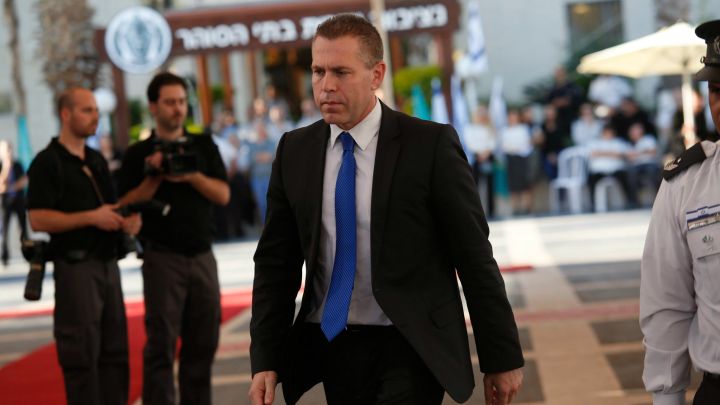Animation of part of letter to the Guardian from Professor Kamel Hawwash on 2 May entitled ‘A Palestinian view on the antisemitism row.’ It is a joint project by Jewish Voice for Peace and Palestine Solidarity Campaign.
Jews & friends who say antizionism is NOT antisemitism
Animation of part of letter to the Guardian from Professor Kamel Hawwash on 2 May entitled ‘A Palestinian view on the antisemitism row.’ It is a joint project by Jewish Voice for Peace and Palestine Solidarity Campaign.
As attacks on the growing Palestinian Boycott, Divestment and Sanctions movement become more frenzied – with Israel’s hawks denouncing it as “evil,” fuelled by Jew-hatred and an existential threat – Israel is simultaneously creating a ‘dirty tricks’ unit to smear BDS groups, and turning to liberal Zionist groups to give its campaign a progressive gloss.
Haaretz reports today that Israel’s minister for strategic affairs, Gilad Erdan, has begun talks with the liberal, pro-Israel advocacy group J Street over the possibility of joining forces to counter BDS. An equivalent liberal Zionist group in the UK is Yachad.

‘Erdan, who is in charge of fighting the BDS movement for the Israeli government, revealed that he met with J Street’s top representative in Israel, Yael Patir, last week to examine the possibility of working together against the movement on U.S. campuses.
‘[…] In recent years, the Israeli government has avoided any direct official contact with J Street. Prime Minister Benjamin Netanyahu has never met with any representative of the group, nor has Israel’s ambassador to the U.S., Ron Dermer. Israel’s previous U.S. ambassador, Michael Oren, even boycotted the group during the beginning of his term, but later opened a dialog with its leaders.
‘As of late, the Jewish community in America has increasingly come to understand that J Street is strategically positioned in the struggle against the BDS movement, due to its ability to communicate with progressives and liberals – the target audience of the boycott movement.
‘J Street’s student branches are active on many U.S. campuses and its membership numbers are constantly on the rise. On some campuses, the group’s members have even succeeded in thwarting boycott efforts.’
Writing in Haartez former official at the European Commission, Mose Apelblat concludes that the Israeli government’s response to BDS – well funded though it is – has been “shoddy, uncoordinated and incoherent.”
‘Besides the Foreign Ministry, the lead ministry responsible for the coordination of the state’s efforts in this area, two other ministries – the Strategy Affairs Ministry and the Ministry for the Diaspora and Public Diplomacy – have been charged since 2009 to join Israel’s communication effort. The Foreign Ministry alone has 68 permanent officials, 10 interns, eight external advisers and 30 people at 15 representations abroad all busy dealing with Israel’s image. But all their efforts have failed. Millions of shekels in budgets have either been wasted or left unused. The audit report lists shortcomings in the planning, management and implementation of information activities.’
As Apelblat explains, the Israeli government either ignores public opinion abroad or overreacts,
‘just as it did when the European Union published guidelines on funding projects in the occupied territories (2013) or on labeling of products from the settlements there (2015). Israel’s government often tends to dismiss legitimate criticism abroad as bottom-line fueled by anti-Semitism.
‘Anti-Semitism is hardly a charge which can be raised against Israeli patriots such as the deputy commander in chief and the former minister of defense when they criticized the erosion of the military code of ethics in Israel’s army. Would the same criticism have been aired by non-Jews abroad, they would have been accused of anti-Semitism. Jews abroad would have been accused of “self-hate”. Thus European criticism of Israel can be conveniently categorized as illegitimate, interfering and motivated by hatred.
‘Instead of taking criticism from its friends abroad seriously and reconsidering the actions that might have given rise to the criticism, Israel’s automatic reaction is to act according to the doctrine of “attack as the best defense”, and to initiate new measures whose effect can only make an already bad situation worse. Attributing reservations about Israel’s policy by other countries entirely to anti-Semitism is too easy and absolves Israel from responsibility for its own actions.
‘[…] With a poor international image Israel will suffer greatly, not least from the resulting international isolation, the alienation of Jews in the diaspora and the emigration of Israeli Jews to other countries which can offer them security and a decent living. The BDS threat, contrary to what Pfeffer claims, is real and is already affecting investment decisions, sales abroad and academic cooperation.’
Also in Haaretz this week, Amir Oren reveals that “in the absence of persuasive arguments to counter boycott calls, much less any plan to change its policies,” Israel has issued a tender for a counterdelegitimizer-in-chief. The official tender calls for someone to be the “head of a tarnishing unit, with a 41-43 rank in the social sciences ranking.” This rank is equivalent to a colonel in the army or a department head at the Shin Bet:
‘The demon confronted by the Netanyahu government is the boycott, divestment and sanctions movement. While the Israel Air Force has precision-guided munitions, the war against BDS calls for new tools. Not, heaven forbid, for changing the policies which so upset many people across the world, who make a distinction between Israel proper and the settlements.
‘Nor does the state comptroller delve into the distinctions among Israel, its government and its policies. He was oblivious to the underlying roots of the world’s reservations regarding the latter, which do not imply a disqualification of the former. The comptroller’s approach is to keep his head down, asking only how much and not why, as if there were a direct causal relationship between action and result, and standards for success. This spring the comptroller published a rather negative report on Prime Minister Benjamin Netanyahu’s performance since returning to office seven years ago, with regard to the “diplomatic and media campaign against boycott movements and the expressions of anti-Semitism overseas.” Continue reading “Israel’s shoddy, incoherent and losing battle against BDS”

The former secretary of state for international development has told the Guardian in an interview about the Chilcot report, that UK groups are using antisemitism as a smear to prevent criticism of Israeli policy, as part of an organised offensive against the BDS movement. Short believes the investigation Jeremy Corbyn has commissioned into antisemitism within Labour will find absolutely nothing to corroborate the charge:
There’s lots of good writing by lots of organisations, including Jewish organisations, saying what a load of nonsense it is. Just allegations and smearing. There is not a current of antisemitism. I’ve lived girl and woman inside and around the Labour party, and the people who are critical of Israel’s policy – and of course, lots of Jews are part of that movement of criticism – don’t say ‘Jews are horrible.’
She adds that the memory of arriving in Leeds as an undergraduate and hearing “a drunken man at the bus stop singing a song about ‘Hitler was right’” still haunts her. “So, I’m not saying antisemitism doesn’t exist. But I’m saying, no, I do not believe there is a problem with antisemitism in the Labour party.
“It’s not to say,” she goes on, “that there might not be people who’ve said antisemitic things. I haven’t heard them, but I find it believable that they clumsily go from their critique of Israeli policy to saying things that are antisemitic. But there isn’t a big climate of antisemitism, there isn’t. It’s just not true.”
Unlike most Labour members currently accused of antisemitism, Short has never described herself as an anti-Zionist. Despite this, she says: “Anyone who is persistently loyal to the Palestinian cause and critical of Israeli policy has been smeared as an antisemite. That’s been going on for a long time. I mean, they did it to me years ago. And it culminated and became a public issue just before the [London] mayoral election, interestingly – and now it’s all gone quiet.”
She did wince at “clumsy Ken” Livingstone’s comments about Hitler and Zionism days before the mayoral election, but insists the allegation of Labour antisemitism was an orchestrated lie. “I’m certain it was organised. I mean, it’s a matter of record that Israel is very worried about the boycotts, disinvestment and sanctions, and has organisations that try to change opinion. These people use antisemitism as a smear to prevent a fair critique of Israeli policy.”